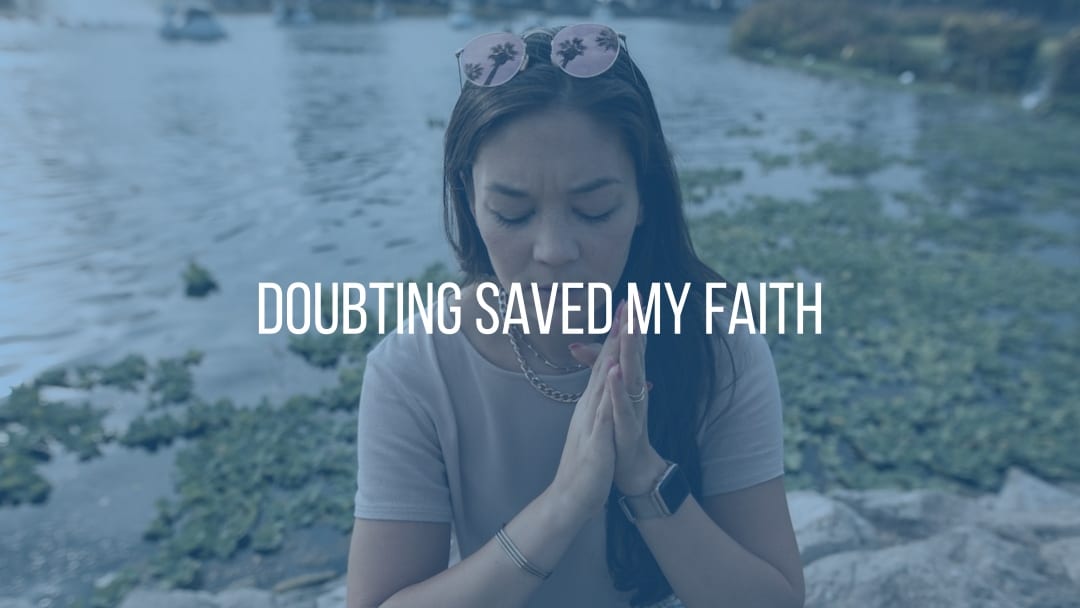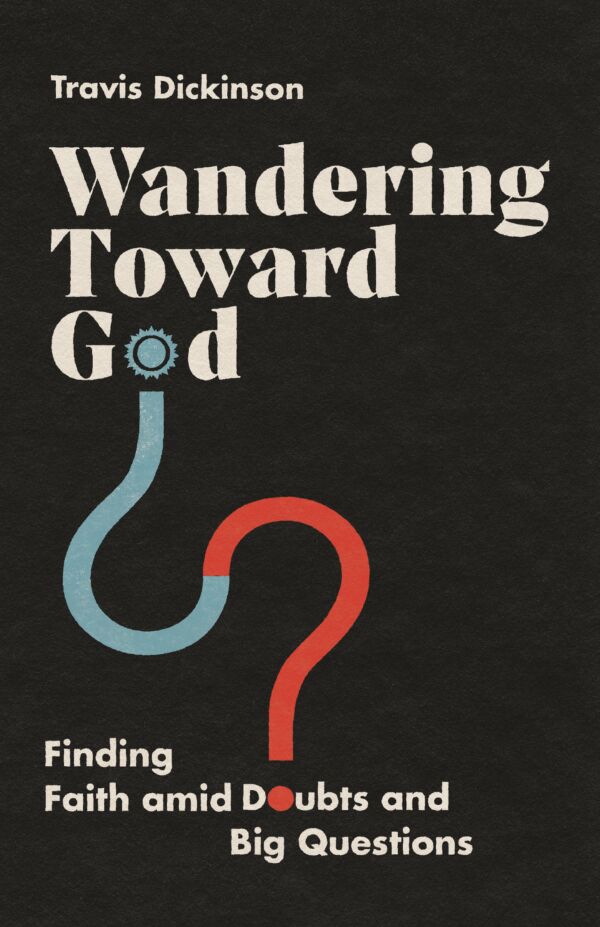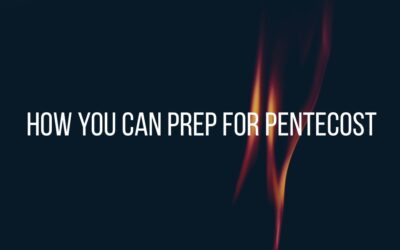Many Christians are terrified of doubting their faith. We avoid questions and challenges in favor of keeping things comfortable and familiar. We worry that if we open ourselves up to the possibility of Christianity being false, we’ll struggle and risk walking away. So we make no space for doubts.
But here’s the problem. Doubts have a way of showing up uninvited.
Doubts in Seminary
For me, I was sitting in a seminary classroom when, in the midst of a relatively uninteresting discussion about world religions, a few doubts came crashing in. We weren’t raising objections to Christianity. We weren’t even really talking about Christianity specifically. We were talking about other religious traditions. But, in that moment, I felt we were being intellectually unfair. It seemed we were dismissing these religious views as obviously false and giving our Christian views a pass. My thought was that it couldn’t be this easy because people actually believe these things.
Then, in a flash, I realized that I’ve been giving Christianity a pass my whole life. I had had a VERY Christian upbringing. My folks were in ministry, I was in church any time the doors were open, I went to countless Sunday school classes, youth group meetings, retreats, conferences, mission trips and even went to Bible college.
I did all this while simply assuming that Christianity was true and all other views were false. I sincerely believed and had given my whole life to Christianity, but I had never really asked why I should think it’s all true. I had never asked questions in that painful and scary way where I was genuinely open to changing my views. That day in seminary I was in the grips of serious doubt. I hadn’t planned on it, but I was deeply shaken.

This is not an uncommon situation, especially with books, websites and YouTube channels specifically designed to cause people to question and doubt. But what do we do about it? Walk away from the faith? Run for your life from the doubt?
Don’t Walk Away…Yet
People often walk away at this point, and this, I’d like to suggest, is a huge mistake. Many of us have been told that we need 100% certainty in our Christian beliefs. But when we are doubting, we don’t have 100% certainty and it can seem, while staring at the doubt, like we aren’t going to get our 100% certainty back. So the person turns away from the faith for the lack of certainty.
But please hear this. Faith does not require 100% intellectual certainty. The greatest heroes of the faith had questions and doubts throughout their lives and often struggled to understand what to believe. Just think of Jesus’s disciples who had questions and often didn’t know what to think. But these remained 100% committed in the confidence that, even if they didn’t understand, God was able to accomplish his will through them. The point is that merely having doubts shouldn’t, by itself, cause us to walk away.
At least, not yet. We may change our beliefs, at some point, but this should only happen after a reasonable evaluation of our beliefs and the doubts we are experiencing. Doubts can be hard hitting in our experience only to turn out to be quite unreasonable upon further investigation. We shouldn’t walk away until we get this figured out.
Don’t Run from the Doubts
When we simply ignore or avoid our doubts, there is a good chance this, if it works at all, only works temporarily. Our doubts tend to come back and they often bring friends! We may very well find ourselves in a more significant place of doubt. Also, in taking this tact, we live a divided intellectual life. To be rational, we ought to only believe what we find to be true. When we find that we don’t have good reasons for a belief, then it’s time to evaluate if it is worth believing.
Doubts act as a warning light that it’s time to evaluate. When we ignore those doubts, we, in effect, don’t care if the belief is true or not. Our beliefs are no longer rational. We’ve prioritized convenience and comfort. But this is a dangerous intellectual place to be. This is especially problematic when it comes to the beliefs of deeply entrenched values around which we organize our lives. These are too important to simply affirm dogmatically in the face of challenge.
So what should we do when we face doubts?
Hang on
The first thing I recommend is to hang on. Pause and take a deep breath. It’s not fun to struggle with doubts but it is completely normal to have questions. Don’t beat yourself up at all. You are being intellectually honest and that is to be commended.

But we don’t want to stay in this place of doubt. Doubts and questions are an important stop on our journey, but they are not where we want to end up.
Doubt Your Doubts
The second thing I recommend is to doubt your doubts. Remember doubts don’t win by default. You need to lean into those doubts and investigate. Doubts only win if there are good reasons backing up the doubts. We want to believe according to truth and nothing else. So we investigate to weigh our beliefs for truth in light of the doubts.
As I experienced doubts as a seminary student, I realized I had to figure some things out. I realized I didn’t have very compelling reasons to believe. But it’s not like I had compelling reasons to believe that Christianity was false either, or that some other view was true. Thus, I had to lean into my doubts to know what to believe.
I tried to do this as honestly as I could. I was ready for the whole thing to come crashing down. It was difficult and it was a lot of work. What did I find? I found there are a lot of good Christian answers. I was actually quite impressed. I found truth and my faith grew incredibly as a result.
Still on the Journey
This isn’t to say I’ve got it all figured out. To be honest, I may even have more questions today than I did back in seminary. But I don’t struggle like I did. I now have profound confidence in the truth of Christianity. This confidence has come from asking the deep and difficult questions, honestly struggling with the doubts that inevitably come, and finding truth. This, in fact, saved my faith.

Travis Dickinson (PhD, University of Iowa) is professor of philosophy at Dallas Baptist University. He has taught courses in philosophy and Christian apologetics for over twenty years and has done apologetics and evangelism in more than thirty-five countries. He is the author of Wandering Toward God. Follow him on Twitter: @TravDickinson. Visit his website at TravisDickinson.com.
Interested in reading more? Travis Dickinson’s book Wandering Toward God takes the discussion of doubt and faith further, exploring how doubts and hard questions about the faith are an important way to express our commitment and love to God.
Don’t Miss
The Latest From Our Blog
New Site Launches Tomorrow!
Watch this Space! Tomorrow (May 29) is the official launch of the new The Pastor's Workshop site! Return to this blog tomorrow morning for a post highlighting the new features and explaining how subscribers can get on and start using the site! Here are some new...
How You Can Prep for Pentecost
This was originally posted on May 12, 2016 on https://huffpost.com Pentecost Came Like Wildfire I'm lying on an ice pack early this morning, doing my back exercises and listening to Pray as You Go, a tool for meditation, with monastery bells, music, and a Bible...
Sacred Spaces: the Church Forests of Ethiopia
Let's Go to Ethiopia! Here’s a fun exercise with a spiritual payoff. Go to Google Maps and view aerial images of the South Gondar zone of Ethiopia. Use this button:When the page loads, you'll see a light brown countryside, mostly farmland. There are thin lines of dark...





